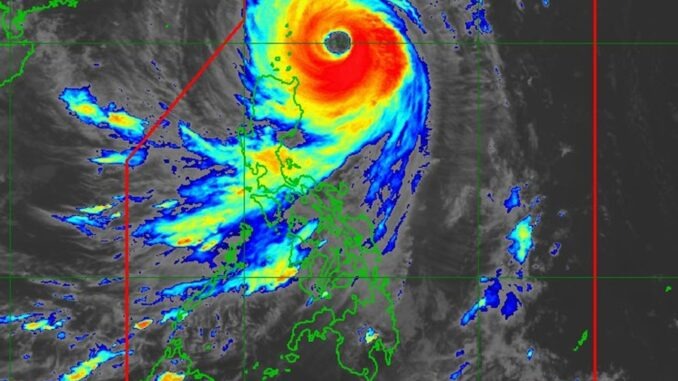
Ameteorologist has pointed out the sheer size of Typhoon Kong-rey’s eye as the massive storm approached Taiwan on Wednesday.
As of Wednesday afternoon, Typhoon Kong-rey had maximum sustained winds of 130 mph, according to the website Zoom Earth. The storm has weakened slightly since Tuesday night, when it was categorized as a super typhoon with maximum sustained winds of 150 mph, equivalent to a Category 4 hurricane. Forecasts anticipate that Typhoon Kong-rey will weaken further by the time it makes landfall in Kaohsiung in the early morning hours on Thursday.
On Tuesday night, meteorologist Noah Bergren of TV station WOFL in Orlando, Florida, commented on the size of the storm’s eye.
“Super Typhoon Kong-rey is easily one of the largest eye’s in a major tropical system you will ever see on Earth,” Bergren posted on X (formerly Twitter). “Thing is absolutely massive.”
A wave crashes outside of Fugang Harbor in Taitung, Taiwan, ahead of Typhoon Kong-rey on Wednesday. The storm is expected to make landfall in Taiwan early Thursday morning. Annabelle Chih/Getty
AccuWeather senior meteorologist Alan Reppert told Newsweek that having a large eye doesn’t necessarily imply anything about the storm’s strength.
“It just means the winds with it are farther away from the center than if it was a smaller eye,” he said. “It doesn’t necessarily have any major defining characteristic of the storm.”
Reppert added that a stronger storm that’s been around longer usually has a wider eye than a newer storm.
Most spaghetti models—or computer models illustrating potential storm paths—show Kong-rey making landfall on Taiwan’s southeast coast and cutting across the island before emerging with maximum sustained winds of around 75 mph. Models indicate that the typhoon will exhibit a northeastern turn away from China, which will take it out to the East China Sea.
Kong-rey’s strength is uncharacteristic for this time of year, The New York Times reported, adding that the typhoon is expected to make landfall equivalent to a Category 4 hurricane.
Reppert warned that strong winds up to 140 mph with higher gusts could hit southern Taiwan, though the storm is expected to weaken as it moves over the island. An AccuWeather report warned of “significant structural damage, mudslides and landslides” from the storm, as up to 3 feet of rain is expected to lash Taiwan. The storm could either maintain its intensity or strengthen before it makes landfall early Thursday.
Eastern China and Japan also are expecting heavy rain as the storm progresses.
A typhoon is classified as a severe tropical cyclone occurring in the Northwest Pacific. A hurricane is the term for the same type of storm in the Northeast Pacific and Northern Atlantic. Outside of these regions, the storms are called tropical cyclones.
A Utah Father And Daughter Are D*ead After A Bulldozer Fell On Top Of Their Pickup Truck Over The Weekend

One risk factor for heart disease is triglycerides. As you can see, triglycerides are created when you eat fat that is not immediately needed. Your blood and fat cells contain them. Fatty acids found in omega-3-enriched eggs lower blood triglycerides. However, take note that the eggs are enhanced with omega-3, or from pasture-fed chicken.
Eggs can reduce the risk of breast cancer, according to a Harvard University study. When eggs were consumed during adolescence, this was most advantageous. A subsequent study, however, revealed that women who ate at least six eggs per week had a 44% lower risk of breast cancer than those who ate fewer. Eggs include choline, which also lowers the risk of breast cancer.
125.5 mg of choline, or almost ¼ of your daily requirement, are found in an egg. In addition to being vital for the brain, choline is helpful for the heart. Choline aids in mood and memory regulation. Research has demonstrated that it supports cognitive processes like verbal and visual memory. Choline helps to create the membranes that envelop your cells. Choline is also necessary for the development of the baby’s brain throughout pregnancy and lactation.
Eggs are a rich source of minerals including iron, zinc, and phosphorus, which are essential for a healthy body. Zinc converts food into energy and supports a healthy immune system. Women need a lot of iron because of menstruation, but it’s necessary for many other purposes. Eggs are also a good source of selenium and iodine, which are needed to produce thyroid hormones.



Leave a Reply